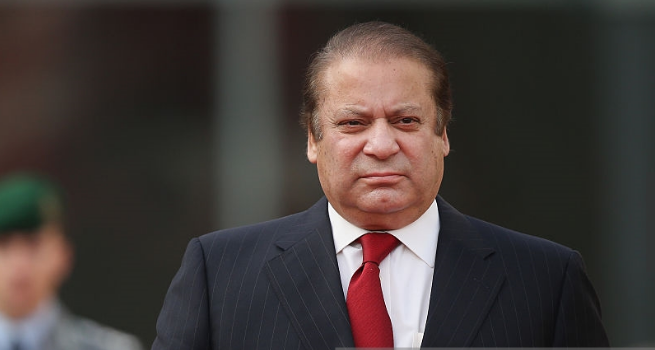
It took an international scandal for Pakistan’s citizens to finally realize how deep corruption runs in their society and that the nation’s leaders remain complicit in promoting it. However, more disturbing than the scandal is the leadership’s reaction—the Panama Papers issue has become another avenue for civilian-military squabbling and petty score-settling between political parties.
The Panama leaks have wreaked havoc in Pakistan, as reports emerged about alleged Pakistani investments in offshore companies in order to dodge taxes and hide wealth, including by the prime minister’s family. Taking a veiled swipe at the government’s failure to launch an enquiry into the Panama leaks, Chief of Army staff General Raheel Sharif called for “across the board accountability” in a speech last week. Although recognized for its timeliness, his speech was also widely criticized by people questioning why accountability measures never involve the military.
Amid this unfolding saga, the army launched a“public relations coup” and sacked serving military officers for corruption, no doubt in an effort to unnerve Prime Minister Nawaz Sharif. Surprisingly, there was no official announcement or information about the dismissed, considering the move was leaked to the media. Even as the Inter-Service Public Relations (ISPR) remained mum over the dismissals, a visibly shaken government continued to believe that the leaks were part of a global conspiracy to destabilize nuclear Pakistan. Only a few days earlier, the same officials had implied that the Panama leaks were an effort by opposition parties to malign the Sharif family.
The army’s involvement did, however, prompt Prime Minister Sharif to cut his London visit short, and address the nation—his second such speech in less than three weeks. Sharif maintained that he had nothing to hide and “presented” himself along with his family, adding he would resign if found guilty. Additionally, he announced that he would write to the Chief Justice of Pakistan to constitute a commission to probe the Panama Papers. However, not by coincidence, the Chief Justice is in Turkey for a week-long trip, delaying the formation of the judicial commission and presumably allowing Sharif more time.
The merits of military involvement in the democratic sphere have long been the subject of enduring debate in Pakistan. Despite the army’s eventual decision to not share the details of its internal cases, its “willingness to focus on professionalism and probity” is a welcome development. General Sharif’s remarks about accountability followed by the dismissal of armed forces personnel got the ball rolling for unprecedented scrutiny of both military bigwigs and politicians. The developments seem to have emboldened the media to probe the assets of former president Pervez Musharraf, amid reports that the inquiry commission would be able to summon and question General Musharraf for alleged transfers involving huge sums of money to offshore accounts.
On the political front, there were indications that those at the helm of affairs in both Pakistan Peoples Party (PPP) and Pakistan Muslim League-Nawaz (PML-N) were in agreement on sweeping this issue under the rug. Rumors doing the rounds were that Nawaz Sharif and Asif Ali Zardari had agreed to a new deal in the wake of the Panama leaks, similar to the one signed between PPP and PML-N in 2006, whereby whichever party is in power will complete its tenure and stop a third party from entering the arena. Senior PPP politician Aitizaz Ahsan’s claim that Sharif planned to meet Zardari in London to plead for his support on the Panama Papers issue lends more credence to these rumors. Reports of a phone call between the two are still making rounds in the media. However, Interior Minister Nisar Ali Khan dismissed these notions.
The PML-N government also tried to deflect attention by hitting back at Pakistan Tehreek-e-Insaf (PTI) chairman Imran Khan, accusing him of using donations earned by Shaukat Khanum Memorial Hospital for foreign investment. To one-up the government, the Pakistan Tehreek-e-Insaf, Jamaat-e-Islami, and Mustafa Kamal’s nascent Pak Sar Zameen Party have planned or held rallies highlighting corruption and lack of accountability as the main problems plaguing Pakistan.
Even as the army is being appreciated for its “sophisticated understanding” of Pakistani politics, the irony that the army has played at least some role in creating this mess seems to be lost on everyone. It was General Pervez Musharraf’s decision to enact the National Reconciliation Ordinance of 2007, a controversial law allowing former PPP chairperson Benazir Bhutto to return to Pakistan without any legal consequences on pending corruption cases against her. Nawaz Sharif himself also benefited from the NRO. This, in a way, set the precedent for how graft cases against politicians would be handled in future. Musharraf later apologized to the nation, acknowledging that the NRO was a political mistake.
On the positive side, the military’s involvement has transformed the characteristic complacency of the Pakistani public in the face of the usurpation, corruption, and venality of both its military and political leadership. Irrespective of the outcome of the probe, quiet acceptance will no longer remain the norm. The public has been galvanized into action, albeit at the behest of both opposition parties and the military—each doing so for their own reasons. Thus, even the latest development that Nawaz Sharif’s name appeared erroneously in International Consortium of Investigative Journalists reports will do little to salvage the situation. That Sharif has been charged with corruption multiple times in the past is reason enough for the nation to question his credibility. Also, the international dimension of the Panama Papers controversy means it will be difficult to brush aside. The scandal will continue to haunt Sharif and the PML-N government in the near future.
***
Editor’s Note: Click here to read this article in Urdu
Image: Sean Gallup, Getty


